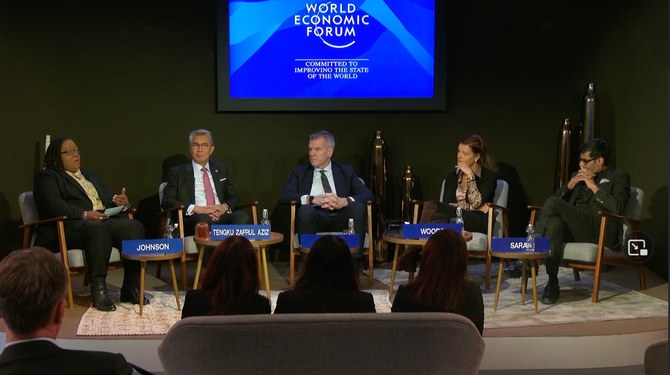DAVOS: Effective cooperation between governments and international corporations is needed to solve crises facing societies worldwide, a panel of experts told the World Economic Forum in Davos.
Speaking at a session titled “Living with Risk,” panelists said while securing a decent standard of living for the population was the responsibility of governments, the private sector and civic groups needed to do their part in providing sustainable solutions to developmental crises.
Ngaire Woods, dean of Blavatnik School of Government at University of Oxford, said that difficulties in solving long-term risks, such as climate change, are the result of disparities between the discourses of public and private sectors.
“There’s a conversation among government leaders talking about goals, commitments and aspirations, asking the private sector to invest billions on the basis of verbal commitments. Private companies, however, cannot invest billions based on aspirations,” Woods said.
“Until these two different conversations are brought together, we will not see a lot happening,” she added.
However, she warned against placing the responsibility of solving crises entirely on global corporations, as “hunger and development crises need to be solved at a national level.”
The support of international organizations, including the World Bank and the International Monetary Fund, would permit governments to solve the debt crisis and serve their population, she said.
Rapid growth of technologies, such as artificial intelligence and quantum computing, could also bring additional complexities despite their transformative power on societies.
Cybersecurity and AI-driven war technologies were among the risks highlighted by the panelists.
Woods said that the excitement surrounding the use of AI to solve major risks of climate change and food security could also be directed to “more immediate” developmental crises facing societies.
Gary Steele, president and CEO of Splunk Inc., said that building resilience in governments and societies is key to facing risks posed by technologies, which would only be achieved through a “better public-private cooperation.”
“As the world broadly digitizes, and more capabilities come online from governments and private companies, there’s a lot of opportunities there that need to be managed with focus on resilience,” he said.
Highlighting the uneven recovery from COVID-19 among nations, Tengku Zafrul Bin Tengku Abdul Aziz, Malaysian minister of international trade and industry, said that governments need to have a “clear roadmap,” with the involvement of all parties in society, to solve the short-term risk of the rising cost of living.
“Engagement is key, because a roadmap cannot be dictated by certain groups,” said Abdul Aziz, adding that “long-term crises will be difficult to solve if we cannot resolve the short-term issues first.”
He added: “Governments alone cannot resolve issues. There’s a need to have collaboration with civil societies and companies. There has to be a whole national approach to manage risks.”















